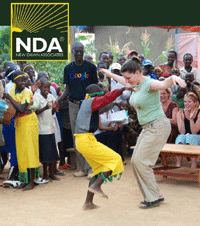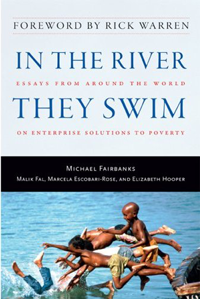Dear William,
While it is generally a pleasure to get to know you, the circumstances are rather sad. I thank you, nevertheless, for inviting me personally to respond to your blog. I'm the Director of the Eos Visions network that got under fire here and - and I'm happy to admit it - the author of the brochure that you and several of your commentators criticize to a point that verges on insult.
I read Ms. Wade's article closely (and will post a response there as well). As a fellow entrepreneur, I can certainly understand her personal problem with the way she was apparently approached by an MVP representative. In fact, our tourism project is doing exactly the opposite - responding to a market demand as I will explain below and just as she does business herself. On top of that - especially as the part-time academic that I also am - I can also understand her general feelings about the MVP approach as a whole (I'll get back to this point later because it is also relevant to your own blog). I also have my doubts about the general sustainability, even though "having doubts" does not necessarily mean "being ready to judge". Where Ms. Wade goes totally wrong, however, is the jumping to conclusions when it comes to our tourism project and the related brochure. Josh Ruxin has already pointed out in his response above that Ms. Wade was totally misguided and misinformed, and used her personal grudge against the MVP to maliciously attack our tourism project and, thereby, our work as a whole.
And, unfortunately, I believe that your blog has taken this even further. Have you ever thought about the reasons why our brochure might display the rules that it displays? Have you ever even tried to understand what the entire tourism project is all about? Well, my first reaction to your blog was total disbelief and rising anger. By now I'm actually grateful for this opportunity to explain our concepts (and the results!) to an audience that - as several of the commentators have pointed out - is certainly not the audience we intended for the brochure. And I can already say at this point: I'd like to officially invite you (and everybody else who was happily throwing criticism around without ever having been on the tour or having talked to those involved) to join one of our tours in the future. You'd be surprised! We even talk about general MVP critics like yourself and their arguments on our tour...
But please allow me to provide a bit more information, adding on what Josh has already written above. When I first visited Mayange, the site of Rwanda's Millennium Village, in 2006, it was a totally desperate area. Among the many obvious problems, one stood out for me, the young social entrepreneur: There was not a single shop to be seen anywhere in the entire area. I was not able to buy anything. The mentality of the community members was entirely relying on hand-outs. My Rwandan (!) partners were equally astonished, and we vowed that we would try to play our role as a private sector company to contribute to a mentality change and allow the community members to help themselves. I then got to know Josh who invited our Rwandan team to get involved and to work with the community members so that they could essentially shape an experience that was, after all, in growing demand. Why? Well, a lot of people (both supporters and critics alike) wanted to learn more about the MVP and its concepts - if only to understand if they really make sense or not. This demand came to Josh and his team, and they basically took a variety of people to the Village, without any real structure and without any coherent way of allowing the community members to participate, to shape the visit and (!) to benefit from it! It was rather clear from the outset that our company as such did not seek any material benefits out of this work - but we were more than happy to become involved because we are a social enterprise and because similar projects are part and parcel of our daily (social) activities. Hence, there was a market (people interested in learning about the MVP approach) and there was a community that was in strong need of an experienced partner in order to help them structure the visits and benefit from them.
Over the course of various months, our Rwandan team facilitated a process of founding a tourism cooperative that now has over 200 members and is entirely managed and run by the community members themselves. We signed MOUs with the cooperative and with the local authorities who vowed to provide their support. We worked with the cooperative members, trained them on a variety of issues (general introductions, presentation skills, guiding skills, language skills, hospitality and customer care, hygiene, environmental management and so on) and also asked them to discuss in participatory ways what we should pass on to the visitors in terms of do's and don'ts. Well, the rules that Ms. Wade, you and some of your commentators are finding so appalling are actually a result of this. The community members found it important to discourage any kind of hand-outs because they knew that they would only encourage more begging and would never achieve the desired mentality change towards more entrepreneurship. They found it equally important to hint to the general cultural issue that it is contrary to local traditions everywhere in Rwanda (and specifically in this region because of the recurrent incidences of malnutrition) to eat or drink in public. You will certainly agree that we - and our clients - should respect the local culture and especially the express wishes of the community. You will hopefully admit that claiming that we do not look at Rwandans living in the MV as "individuals who possess rights and human dignity" BECAUSE of these rules, is outrageous. It would certainly have been better to inform yourself before attacking us and our reputation...
And since you and, even stronger, one of the commentators mentioned that the results are merely good intentions (our "self-proclaimed" 70% profit sharing etc), I'm happy to share the full statistics with you and to show that our little contribution has been well documented and is actually rather significant - contrary to what especially the commentator seems to believe. Over the first 18 months of the project, there were 488 visitors taking a tour of the MV, organized, run and guided by the community members (!!!), with our own guide facilitating the visit and providing additional introductions and information. The experience did expressly NOT include "viewing" the life of the villagers or anything related to poverty or the like. Visitors don't enter homes, and there are absolutely no "voyeuristic" elements involved anywhere. On the contrary, community members take the visitors to various interventions sites where they explain MVP interventions through their own eyes, how the situation used to be before the MVP arrived, what the MVP taught them and how the situation has changed since them. The "tourism product" (if you allow me to use this term) therefore becomes the set of interventions through the local eyes - nothing else, not "poverty porn", no "zoo" and so on. Back to the figures: The 488 visitors paid an average of just below USD 67, a total of USD 33,085. Roughly USD 17,540 were spent on various costs related to the tour, so that a profit remained of roughly USD 15,545. Of this, the community received no less than USD 12,328 or 79.3% (i.e. even more than our promised 70%). I don't know what you think about this, but I believe that over USD 12,000 in 18 months earned through entrepreneurial ventures by a local community that previously did not even have a shop to sell anything is a huge success!! On top of this comes another significant amount for the sale of handicrafts and food items. How was the money disseminated? Well, again we merely facilitated the decision making of the community. They decided that those villagers who are actively involved in presenting and guiding some of the interventions should receive individual remuneration for their service. Groups involved in the activities are paid as groups. Additionally, the community has installed funds for education, health care and general community development (the latter being used e.g. for the construction of homes for the most vulnerable members of the community). Everything is completely accounted for and I could give you exact figures broken down into all these various dissemination mechanisms. Equally importantly, we can see a huge amount of positive immaterial impacts. These include, among many others, the desired mentality change towards more entrepreneurship, stronger local ownership of the entire MVP approach, cultural benefits through a revitalization of arts, crafts, dance and music, and even reconciliation and peace building on a small level.
I truly hope, William, that you are now able to acknowledge that you based your judgment on false conceptions and missing information about our work. You will have noted that I did not attempt to protect or justify the MVP as a whole. As mentioned in the beginning, we have as many doubts as you have. But we still believe that the concept deserves a chance and that it has to prove itself right or wrong. The tourism project has nothing to do with Jeffrey Sachs and his team - they merely invited us to work with the MV community and provided some support (we especially worked with their own community mobilizers). Beyond this, the MVP concepts are not important to us and we ensure that the visitors receive an unbiased view that even talks about criticism from the likes of you. The tour is truly educational and informative - and it provides wonderful opportunities for the local community. I do hope that also the very critical commentators will have found a different perspective on what they call "poverty tourism" or even "poverty porn". Our project is anything but an excursion to the zoo. And calling us "condescending" is a real insult if you really understand our concepts and philosophies.
Let me finish once again by inviting you to visit the project with us. Who knows, you might even learn something yourself about the MVP approach. Apart from that, I strongly encourage you to keep in touch and to do more research on tourism related to development. I may add that I gained my PhD looking at the question how we can "maximize the poverty-reducing impacts of tourism in Rwanda". Much of our current work under the Eos Visions umbrella relates to this. I'd be more than happy to interact more frequently with you on related matters. I also plan to publish our experiences and related statistics in the future in academic journals.
Kind regards,
Michael

 From Aid to Equality
From Aid to Equality


 Senegalese entrepreneur Magatte Wade on the
Senegalese entrepreneur Magatte Wade on the  A wise economist that I met recently tipped me off that I would find the latest Army field manual interesting reading. He was more than right about that. The 2009 US ARMY STABILITY OPERATIONS FIELD MANUAL (available in a
A wise economist that I met recently tipped me off that I would find the latest Army field manual interesting reading. He was more than right about that. The 2009 US ARMY STABILITY OPERATIONS FIELD MANUAL (available in a 
 “Whenever any form of government becomes destructive to [the pursuit of liberty], it is the right of the people to alter or to abolish it.”
“Whenever any form of government becomes destructive to [the pursuit of liberty], it is the right of the people to alter or to abolish it.” Welcome to the Great NYU Play-In Revolution that occurred at 5pm on Sunday, June 7, 2009. A community living in a high-rise NYU housing complex rose up in revolt after the Rulers tried to crack down on such criminal behavior as kids playing with balls and skateboards in the plaza around the high-rises.
Welcome to the Great NYU Play-In Revolution that occurred at 5pm on Sunday, June 7, 2009. A community living in a high-rise NYU housing complex rose up in revolt after the Rulers tried to crack down on such criminal behavior as kids playing with balls and skateboards in the plaza around the high-rises.
 As the crowd gathered, the Rulers responded with a show of force, but ultimately backed down before the impressive show of people power.
As the crowd gathered, the Rulers responded with a show of force, but ultimately backed down before the impressive show of people power.
 The title of this blog will make many think I am callous, and yet I definitely agree that poverty is an EXTREMELY BAD THING. Perhaps some use the words “human rights violation” to be equivalent to “extremely bad thing,” but why? There are many different “extremely bad things,” and it helps if everybody discriminates between them.
The title of this blog will make many think I am callous, and yet I definitely agree that poverty is an EXTREMELY BAD THING. Perhaps some use the words “human rights violation” to be equivalent to “extremely bad thing,” but why? There are many different “extremely bad things,” and it helps if everybody discriminates between them.